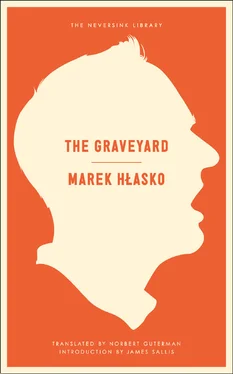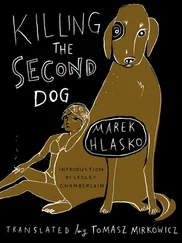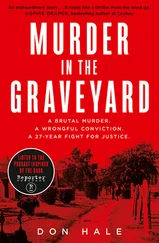He gazed at the hysterical quivering of the neon sign and thought: “And yet I must have done something. Somewhere inside me there must be some doubt I wasn’t aware of; it rose to the surface at the first opportunity, in a moment of exhaustion. What was it I doubted? The party? The people? The leadership? Or could it be the cause? How strong a man must be to go through life with a clear head, ignoring doubts, fears, sordid thoughts! What would I have been if I had no faith in the cause, if it had not been my goal, if it were not my goal even now, my brightest star? Bear? A madman. What did Mikołaj say? Stand up and fight. Very well, I will.” He was strong again. It seemed to him that from the silent city, from the calm sky, from the streets below and the stars above, faith invaded him, effacing all his trials, and that this faith would endure in him as long as the earth turned around the sun.
“Good night, Elzbieta,” he said.
HE WAS ABOUT TO LEAVE THE FACTORY: THE SIRENS were wailing. He punched his timecard and was walking toward the gate, when the porter stopped him. “I have a little note for you,” he said in a strangely official tone, without his usual wink. He took out his receipt book, and slowly moved his trembling finger over the page, looking for the place. “Oh, here it is,” he said finally. “Please, sign here.”
Franciszek signed and walked out. In the street he stopped to read the note. The Personnel Department was notifying him that his employment would be terminated in three months; during that time he would have to look for another job and another apartment.
“Hey, Citizen!” someone cried behind him.
He turned around. Jarzebowski was running toward him, his overcoat unbuttoned, his hair flying in the wind.
“Well?” he shouted from a distance. “Well, how about it?”
“What do you mean?”
“You don’t know? Our glee club. You’re gifted, you know; there’s no doubt that you have a real talent …”
Franciszek smiled and walked away. He stared at the crumbling wet sidewalks, thinking: “Aren’t they right? They don’t trust me and they don’t want me — it’s simple.” At this moment he was proud of his party, of the men who had expelled him; he was proud of their logic, inflexibility, purity; he was proud of his son, Mikołaj. And he thought happily that had he been in their place he would have acted as they did. Stand up and fight, return to them pure, and deserving to be trusted — that was what he had to do.
The sidewalk ended suddenly at a long red wall; he was walking across an empty square, full of mud. Somewhere at the end of it a group of people had gathered, murmuring joyfully; he could also hear the barking of a dog — undoubtedly a very big dog. He walked up to them without thinking, and elbowed his way through the ring of bystanders. The object of their curiosity was a man in a fencing mask and gauntlets, who was pulling a beautiful dog by a chain, addressing it with horrible curses. It was obvious that the beautiful dog was quite unimpressed by the curses. Franciszek thought at first that the strangely dressed man was some sort of trainer, and was about to turn away, when the man suddenly removed his mask with a tired gesture, and Franciszek saw before him the frantic eyes of Comrade Nowak.
“Nowak,” he cried in surprise. “What the devil are you doing here?”
Nowak wiped the sweat from his forehead. “Ah, it’s you,” he said in a wooden voice. “Have you got a cigarette? I’m exhausted …”
“What are you doing with that dog?”
“The dog?” asked Nowak, staring vacantly. He had a bitter smile. “True, for you it may be only a dog, but for me …” He suddenly raised his fists to the sky, and howled: “For me it’s worse than a hyena, worse than leprosy.” He jerked the chain, but the dog did not even budge. “Red, you damn’ beast,” Nowak cried, “stand up! Stand up, I say!”
The crowd around them laughed happily. The beautiful dog sat motionless, staring haughtily out of its bronze-colored eyes.
“Red,” Nowak whispered. He lurched as he raised his right hand in a dramatic gesture. “Red, I implore you … Red, my precious, stand up, please …”
“For God’s sake,” said Franciszek angrily, “what do you want of this dog?”
“What do you mean?” Nowak asked. “You yourselves ordered me to change his name!” He moved closer to Franciszek. “He used to be called Sambo, and everything was fine,” he whispered passionately. “A real jewel, not a dog: he brought me the newspaper in his mouth; he loved the children; he walked my little girl home from school; he looked after a blind old man from across the street; and so on … But ever since the party secretary ordered me to call him Red — you remember, don’t you? — his character has changed. He attacks everybody; he snaps; my wife is leaving me; she can’t get along with him. She’s already seen a lawyer …” He sighed. “All because of the dog. Of course, this won’t be mentioned in court; we mustn’t compromise the party …” He gritted his teeth. “We’ve decided she will say I didn’t satisfy her sexually, and that she believes in free love. Of course, we’ll keep seeing each other somehow. But we can’t do it any other way without compromising the party; we can’t. There’s no other way, really there isn’t. I’ve thought it over very carefully.”
“But can’t you get rid of the dog?”
“Get rid of him?” Nowak repeated, suddenly amused, and looked at Franciszek as if he were a kind of imbecile. “Get rid of him? I tried to drown him; I gave him a pound of rat poison a day; I turned on the radio full blast and left my family for three days; I took him a hundred miles from Warsaw, and he came back. But I can’t sell him with the name Sambo — that would be like giving arms to the enemy. No, I can’t get rid of him: the Michurin-Pavlov Society would get after me in a second— What have you done with your dog? Why do you mistreat animals? Don’t you realize what a dog can do for a man, particularly for a party comrade?…” He resolutely put on his mask. “Excuse me,” he said, “but I’ve got to get to work. This is my party assignment; for this purpose I was released from participation in the city-to-village campaign.” He jerked the chain desperately. “Come on, Red,” he cried. “Stand up!”
The dog pricked up one ear, then lay down on its belly, stretching out its two aristocratic forelegs: he looked like a fur rug. Jerks, curses, caresses, promises — nothing helped. Nowak toiled and sweated, the crowd roared happily, and amid this commotion only the dog remained noble and calm.
“What’s going on here?” a brisk voice cried suddenly. A young policeman forced his way through the crowd. “What’s this?” He turned to the nearest spectator and looked him sternly in the eyes. “Is there something you don’t like? Now tell the truth: you don’t like the regime?”
“Mr. Authority,” said the other. “I’m leaving. I’ve already left. I’ve never been here.”
He tipped his hat, and vanished. Reluctantly the crowd began to disperse. Only Franciszek, Nowak, the policeman, and the dog, who was exquisitely licking his paw, remained on the square.
“What are you up to?” the policeman asked Nowak. “What’s the matter with you? Is it a joke or what? I see you don’t like it here. If so, better say so, right away.”
“I’m training a dog,” Nowak replied haughtily. He removed his mask and fanned his flushed face. “If you don’t believe me, there”—he pointed—“there’s my factory, and you can find out all about me. I’m training the dog on the secretary’s orders.”
They stared at each other.
“What are you teaching it?” the policeman asked.
Читать дальше






![Ричард Деминг - Whistle Past the Graveyard [= Give the Girl a Gun]](/books/412176/richard-deming-whistle-past-the-graveyard-give-t-thumb.webp)


